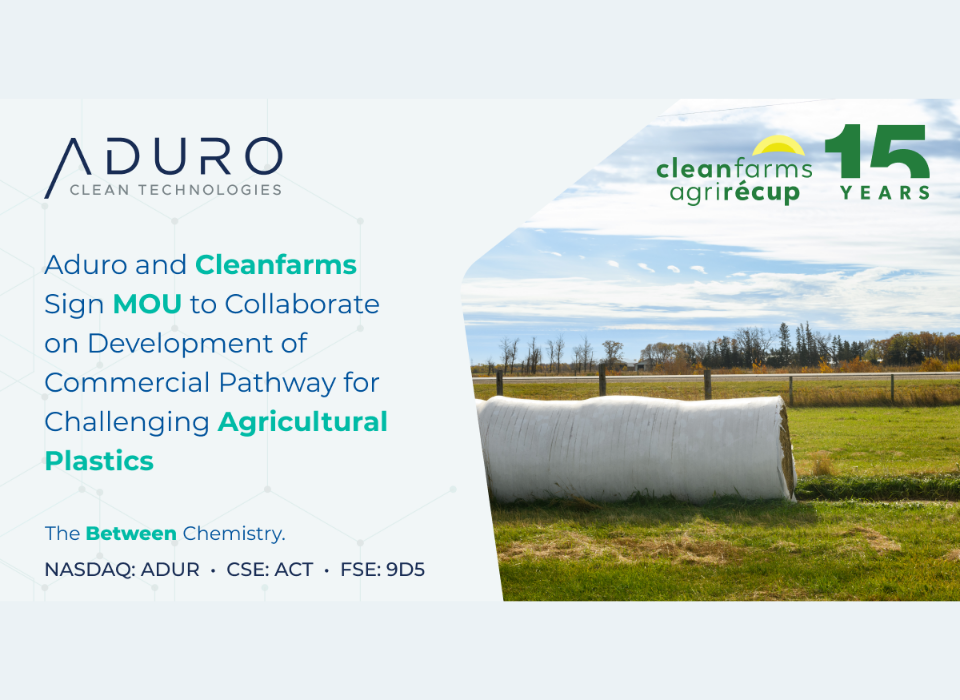
Aduro Clean Technologies Inc. , a clean technology company using the power of chemistry to transform lower-value feedstocks, like waste plastics, heavy bitumen, and renewable oils, into resources for the 21st century, today announced the signing of a Memorandum of Understanding (“MOU”) with Cleanfarms Inc. (“Cleanfarms”), which is known as AgriRÉCUP in Quebec.
Cleanfarms is a Canadian Producer Responsibility Organization (“PRO”) focused on agricultural waste management. The MOU outlines a multi-phase collaboration to evaluate the technical and economic feasibility of using Aduro’s Hydrochemolytic™ Technology (“HCT”) as a potential commercial-scale solution for the chemical recycling of on-farm plastic waste that is currently difficult to manage through conventional methods.
Agricultural plastics such as silage film, bale wrap, grain bags, netting, and twine are essential in modern farming operations but can present recycling challenges due to high levels of contamination and limited viable end-of-life options. In Canada, the agricultural sector generates an estimated 62,000 tonnes of plastic annually, much of which is landfilled, burned, or stockpiled. Globally, agricultural value chains used approximately 12.5 million tonnes of plastic products in plant and animal production in 2019, according to the Food and Agriculture Organization of the United Nations.
Cleanfarms operates within Extended Producer Responsibility frameworks in several provinces and works with more than 200 member companies and a network of over 2,000 collection sites to ensure these materials are responsibly managed. In 2023 Cleanfarms achieved an 87% recovery rate for pesticide and fertilizer containers under 23 litres, reflecting the effectiveness of its programs and the commitment of Canadian farmers to environmental practices.
These capabilities make Cleanfarms a critical partner in enabling real-world evaluation of Aduro’s Hydrochemolytic™ Technology, which has demonstrated strong performance on contaminated and mixed-polymer feedstocks. The MOU and respective collaboration aim to assess the potential of HCT to convert difficult-to-recycle agricultural plastics into usable hydrocarbon products, supporting improved diversion, resource recovery, and circularity in the farming sector.
The collaboration will progress through three stage-gated phases designed to evaluate the technical and economic feasibility of using the Hydrochemolytic™ Technology to process post-consumer agricultural plastics. Phases A and B are binding, while Phase C is non-binding and contingent on the successful outcomes of the earlier phases.
Phase A: Laboratory Feasibility Trails - Aduro will conduct laboratory-scale testing on representative agricultural plastic waste samples provided by Cleanfarms. These samples are expected to include mixed silage film, bale wrap, grain bags, bale netting, and polypropylene twine in their collected, unprocessed form to reflect real-world levels of contamination from soil, organic matter, and moisture. Aduro will assess sorting and pre-treatment requirements and conduct batch Hydrochemolytic™ processing trials to determine contaminant tolerance, conversion efficiency, and product composition. The results will help define preprocessing requirements and feedstock suitability for scale-up.
Phase B: Scale-Up and Process Modeling – Cleanfarms will supply larger volumes of field-grade agricultural plastics for processing in Aduro’s Next Generation Pilot plant. Aduro will evaluate system performance under continuous flow, investigate preprocessing needs, and assess operational stability. This phase will also include the development of a preliminary techno-economic and eco-efficiency model, incorporating key processing parameters, product yields, environmental impact, and potential market value of outputs.
Phase C: Demonstration Plant Integration – Contingent on the successful completion of Phases A and B, agricultural plastics may be evaluated as a potential feedstock for inclusion in Aduro’s planned Demonstration Plant. While the project is in early-stage development, securing representative, scalable feedstock streams is a critical component. This phase would support validation of continuous operation with agricultural plastics and further refine the techno-economic model, leveraging Cleanfarms’ experience in logistics and national collection programs to inform broader commercial deployment strategies.